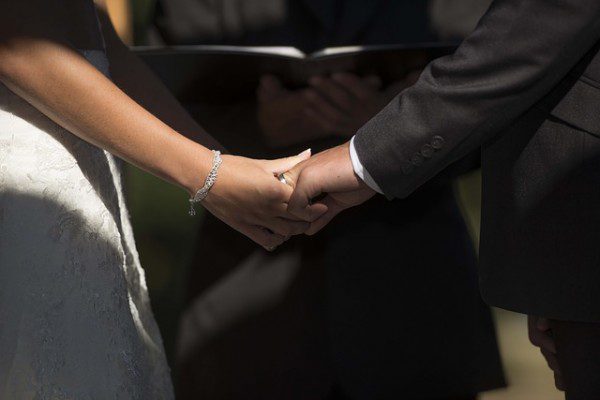With the government legalizing same sex marriage, many Christians and their pastors are asking, what does marriage have to do with the state? It’s a religious institution. Let the church marry people and the state can stay out of it.
Some pastors are marrying couples who aren’t bothering to get a marriage license. In some cases, elderly couples are asking pastors to marry them “in the eyes of God, but not the state” so that they can avoid the legal entanglements and financial issues that come with an official, government sanctioned marriage.
But Rev. John Frahm explains why the church cannot marry people outside of the civil ordinances. If you are a Catholic, believing that marriage is a sacrament, that might work. But not if you are a Protestant. This was actually an issue during the Reformation. The church had so many restrictions and so much control over marriages that the Reformers pushed for the civil authorities to regulate and conduct marriages, which would then be blessed in a church service. (Or conducted in a church with the pastor functioning as an officer of the state. “By the power vested in me by the state of Oklahoma, I now pronounce you husband and wife.”)
Lutherans particularly cannot “leave the government out of marriage.” Their confessions and theology don’t let them.
This by no means diminishes the value or significance of marriage, which was established by God and which mirrors Christ and the Church. God is still the One who “joins together” (Matthew 19:6). It’s just that God uses the civil realm to bring men and women into this vocation.
But what if the state interferes with God’s design, as it is doing with same sex marriage, easy divorce laws, and the like? Pastors mustn’t cooperate with those. But that doesn’t negate the state’s general responsibility for marriage.
Read Rev. Frahm’s discussion after the jump.
From Rev. John Frahm, Married in the Eyes of God But Not the State? | Steadfast Lutherans:
Increasingly in our circles, one hears of assertions of “pastoral discretion” being invoked to support an “exception” in regard to marriage for cohabiting couples who are members of our congregations. The most commonly stated reason for such is financial in some form or another. The loss of benefits, purging of assets upon entering into a nursing home, or some other inheritance ramifications are cited as legitimate examples for pastors to conduct a “wedding in the eyes of God but not of the state.” This is emerging epidemic due for attention from those supervisinour polity, as the first generations that passed through the sexual revolution of our culture are entering retirement age and natural marriage is under assault.
It is clear in the Treatise on the Power and Primacy of the Pope that if clergy exercise jurisdiction in civil matters of marriage it is by human authority and not constitutive of the office of the holy ministry in and of itself. The Treatise describes the situation where the bishops, who exercised such responsibilities only by extension of civil authority (left-hand kingdom) abused their powers and that therefore it is appropriate to re-establish civil authorities to handle such disputes regarding marriage:
There remains the jurisdiction in those cases which, according to canonical law, pertain to the ecclesiastical court, as they call it, and especially in cases of matrimony. This, too, the bishops have only by human right, and that, not a very old one, as appears from the Codex and Novellae of Justinian that decisions concerning marriage at that time belonged to the magistrates. And by divine right worldly magistrates are compelled to make these decisions if the bishops [judge unjustly or] are negligent. The canons also concede the same. Therefore, also on account of this jurisdiction it is not necessary to obey bishops. 78] And, indeed, since they have framed certain unjust laws concerning marriages, and observe them in their courts, there is need also for this reason to establish other courts.
Marriage is understood to be a matter obtained via the left-hand kingdom, though not without right-hand kingdom implications and concerns, to be sure. Since Lutherans use a different theological definition of a sacrament we do not enumerate marriage as a sacrament in the sense of Baptism, the Lord’s Supper or even Absolution, however, it does remain a mystery of God’s design and creation, with implications for the proper understanding of the Gospel. Apology XIII observes in a rather balanced way:
Matrimony was not first instituted in the New Testament, but in the beginning, immediately on the creation of the human race. It has, moreover, God’s command; it has also promises, not indeed properly pertaining to the New Testament, but pertaining rather to the bodily life. Wherefore, if any one should wish to call it a sacrament, he ought still to distinguish it from those preceding ones [the two former ones], which are properly signs of the New Testament, and testimonies of grace and the remission of sins. 15] But if marriage will have the name of sacrament for the reason that it has God’s command, other states or offices also, which have God’s command, may be called sacraments, as, for example, the magistracy.
The Augsburg Confession understands marriage as something enacted under the auspices of civil government (see AC XVI). Notably, AC XVI also points out strongly:
They [our churches ] condemn also those who do not place evangelical perfection in the fear of God and in faith, but in forsaking civil offices, for 5] the Gospel teaches an eternal righteousness of the heart. Meanwhile, it does not destroy the State or the family, but very much requires that they be preserved as ordinances of God, and that charity be practiced in such 6] ordinances. Therefore, Christians are necessarily bound to obey their own magistrates 7] and laws save only when commanded to sin; for then they ought to obey God rather than men. Acts 5:29.
While we would no doubt state that the nature of marriage itself is a reflection of the relationship of Christ and His Bride, the Church, marriage itself is contracted under the kingdom of the left, under the regulations of civil government. When the church capitulates to the debauchery of the culture in its confession of marriage, the preaching of the Gospel suffers, and the message is distorted. As the second epistle of John makes clear, we only know God truly through the rightly taught Word and not in some way abstracted from the Word. In both right and left hands of God’s rule, He works through such authorities in this fallen world of people, as imperfect as they are. This is clear in the explanation to the Fourth Commandment in both catechisms. Being subject to authority is a matter of the right and the left-hand kingdoms (Hebrews 13:17; Romans 13:1-2).
Christians are bound to obey their magistrates and laws except when sin itself is demanded. But the conduct of a wedding is not a “peculiar church power” but a civil matter, no matter the desire for the religious context and blessing.
















